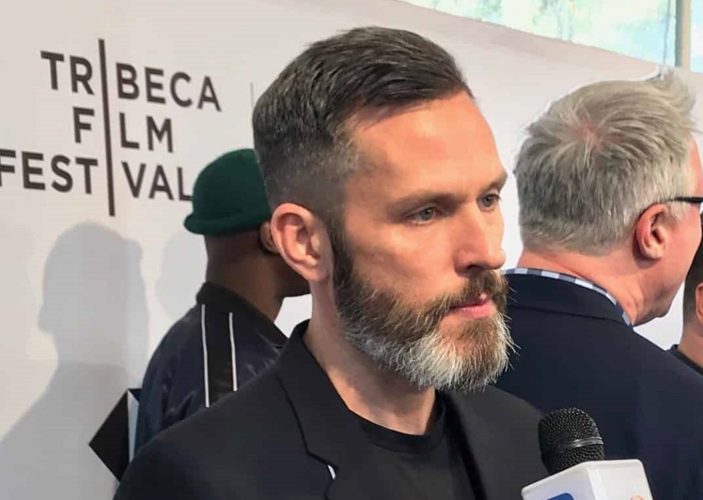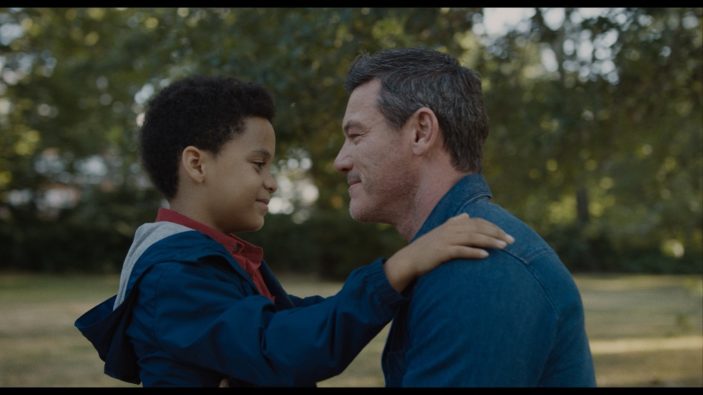
Premiering at this year’s Tribeca Film Festival, Bill Oliver‘s Our Son is where drama meets mindfulness as audiences explore contemporary relationships between two men (played by Luke Evans and Billy Porter) trying to make their way in the world of parenting their child in the aftermath of their separation. This story unabashedly unfolds with the pride and wherewithal of the path paved before, as well as proving an engaging look at the space beyond the traumatic overtures and trappings that the queer community knows all too well.
To coincide with Our Son‘s screening at the festival (you can read our review here), Peter Gray spoke with Oliver about how long he’s wanted to tell this story, if queer projects are becoming easier to telegraph, and how casting openly gay actors ushered the film along.
Congratulations on Our Son. I’m someone who always appreciates when queer stories are told, and it feels like we’re seeing queer stories being more prominent and we’re being treated as if we’re “normal people.” Have you found that it’s becoming easier to tell these kind of stories?
I have to be honest, it was not easy to get (Our Son) made, and that was for a number of reasons. For starters it’s a drama and it was done independently, so we had to start from scratch. (Our) producer was incredibly devoted and, of course, getting the two lead actors (Billy Porter and Luke Evans) helped take it over. In that sense it’s progress, as these are two stars who are openly gay and they will help get this movie financed. It wasn’t too long ago that that was not possible and you would have to cast a straight actor in the lead just to get the film made. That was something that was not acceptable to us for this film, because it just needed to feel very authentic (and) very lived in. We were very fortunate that we were able to cast them and they helped get the movie made.
On the mention of Luke Evans and Billy Porter, were they the immediate people you thought of when it came to casting?
They were pretty immediate. Billy was the first person cast. Several years ago, actually, we sent him the script, and he responded to it. We met by Zoom and he talked about wanting to show a side of himself that he hadn’t shown before in his work, which is a quieter and more domestic side. That was exciting for me, too. And then Luke came on after that, and he also just really responded to the script and was excited to work with Billy. They’d never met before. Both are so experienced, but neither had done something like this, (so) they were very excited to do it.

It was really great to see Billy Porter in a role like this. We’re so used to seeing him as the loud comic relief, and his performance here is showcasing queer people as fully realised. He’s able to step away from what I think many people immediately put him in a box for. In writing this film, how many years has it be ruminating for you?
It was several years. I would say close to 5 years. We wrote it prior to the pandemic, and then that put a bit of a stall on it. We were (still) working, writing, and raising the money, but we couldn’t shoot during that time period unlike other studio projects that could afford to do so. My first short film was something very close to home (for me), it was a coming out story based on my own family experience, and then I went on to make other films (and) they may have had gay characters, but it wasn’t front and centre. The idea of divorce came to my writing partner and I as something kind of exciting and that we hadn’t seen before. More importantly, it allowed us to explore themes that we are interested in, which is family drama, friendship, relationships, and intimacy.
At the centre of the movie is this divorce trial, and I remember reading somewhere that a divorce lawyer overseeing a case similar to that in the film was quite taken aback with how the two men involved embraced each other after the hearing. We aren’t people who take marriage for granted. It was so comforting to watch this film and reflect that this is probably how such a situation would play out. There’s a respect to how we treat each other. And having Billy Porter and Luke Evans play characters who are polar opposites in terms of their personalities and how they raise their son, is there a particular character that you identify more with in terms of a parenting style?
Yeah. I am a dad. I helped a lesbian couple as their sperm donor, and I was involved in raising the kids in a somewhat arrangement similar to a divorced couple, where they were mainly raised by their moms but they spent time with me back and forth. I’m not divorced, but I could sort of relate to that (situation). And then I discovered by writing partner is not a parent, but he’s a devoted uncle to two nieces, and he’s very close to them, so we tapped into that as we were writing (the film). It started off as a movie about divorce, and then became a movie about fatherhood. Doing the film about two fathers was kind of an interesting way to explore the different sides that I felt about parenting and how it’s never all one thing.
I relate to Gabriel (Billy Porter’s character) in the sense of I enjoyed cooking and bathing, and putting (the kids) to bed and reading to them. I was raised by a father who was a lawyer, and he’d come home, have dinner and then retire to the back. I, as his son, certainly inherited some of those traits that I sometimes have to work against, because it’s not easy being a parent and you can’t always be perfect and there for them. I related to both in some sense. We didn’t want to make Nicky (Luke Evans’ character) the “bad parent”, or worse. They just have different styles of parenting and different ways of expressing their love for the child.
It was really just the honesty of the story that sat with me. It’s celebrating queerness in a way that people won’t expect.
With gay marriage I think there’s a little bit of an expectation to be perfect. Where people struggle with that is that they have to be the perfect son or the perfect student, and it was important to us to show these characters who are not perfect and are flawed, but despite their flaws they love and support each other.
Our Son is screening as part of this year’s Tribeca Film Festival, running between June 7th – 18th, 2021. For more information head to the official Tribeca page.
